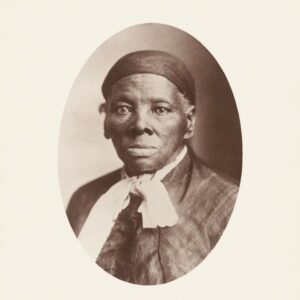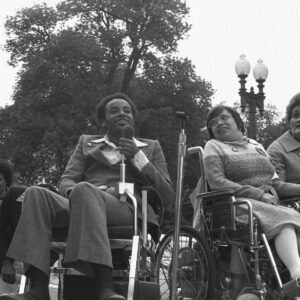Black History Month gives us the opportunity to recognize and celebrate the achievements of African Americans in the history of the United States. In honor of Black History Month, we wanted to share the accomplishments of three Black people with similar disabilities for which Can Do Canines trains assistance dogs. These individuals made significant contributions to the African American community and made a lasting impact with their advocacy and education efforts for people with disabilities. Let’s meet a few of these remarkable people.
 Harriet Tubman is known as one of the greatest Black liberators of all time. After being struck by a two-pound weight as an enslaved teenager, Tubman began experiencing what she then referred to as sleeping spells but what Black historians now believe were most likely epileptic seizures. Even though she needed to take many rest breaks, Tubman ventured into the depths of slave country multiple times to free enslaved people.
Harriet Tubman is known as one of the greatest Black liberators of all time. After being struck by a two-pound weight as an enslaved teenager, Tubman began experiencing what she then referred to as sleeping spells but what Black historians now believe were most likely epileptic seizures. Even though she needed to take many rest breaks, Tubman ventured into the depths of slave country multiple times to free enslaved people.
 Brad Lomax was a man who led a nationwide anti-discrimination campaign on behalf of people with disabilities. Lomax had multiple sclerosis and used a wheelchair, and while living in California, he had difficulties using the transit systems and navigating public areas due to limited accessibility. He was a leading force behind the historic 504 sit-ins that prompted the government to implement Section 504 of the Rehabilitation Act, which was a seminal moment in the Disability Rights Movement. While the 504 regulations pushed the government toward accessibility, they applied only to federally funded programs. But their enactment laid the groundwork for the Americans With Disabilities Act, which was passed in 1990.
Brad Lomax was a man who led a nationwide anti-discrimination campaign on behalf of people with disabilities. Lomax had multiple sclerosis and used a wheelchair, and while living in California, he had difficulties using the transit systems and navigating public areas due to limited accessibility. He was a leading force behind the historic 504 sit-ins that prompted the government to implement Section 504 of the Rehabilitation Act, which was a seminal moment in the Disability Rights Movement. While the 504 regulations pushed the government toward accessibility, they applied only to federally funded programs. But their enactment laid the groundwork for the Americans With Disabilities Act, which was passed in 1990.
 Claudia Gordon lost her hearing at the age of eight. What followed was a contracting of her social circle—friends slowly disappeared, and what was usually a cheerful “hello” was replaced by an awkward smile, curious stares and ridicule. Thanks to the values that were instilled in her at a young age, she understood then that those voices of doubt neither dictated her worth. She wanted to contribute to a better society where there is more understanding and acceptance of people with disabilities and where the same opportunities are provided for all. Claudia is active in both the Black deaf community and the disability community and is Vice President of the National Black Deaf Advocates. She is also associated with the National Coalition for Disability Rights. A long-time disability advocate, she exemplifies and advocates from an intersectional perspective as a deaf woman of color.
Claudia Gordon lost her hearing at the age of eight. What followed was a contracting of her social circle—friends slowly disappeared, and what was usually a cheerful “hello” was replaced by an awkward smile, curious stares and ridicule. Thanks to the values that were instilled in her at a young age, she understood then that those voices of doubt neither dictated her worth. She wanted to contribute to a better society where there is more understanding and acceptance of people with disabilities and where the same opportunities are provided for all. Claudia is active in both the Black deaf community and the disability community and is Vice President of the National Black Deaf Advocates. She is also associated with the National Coalition for Disability Rights. A long-time disability advocate, she exemplifies and advocates from an intersectional perspective as a deaf woman of color.
Harriet, Brad and Claudia’s stories are a reminder of the change that can take place when we partner together and advocate for, and with, people with disabilities. While much has changed in the realm of disability visibility, we need to continue to advocate and make changes so people of color with disabilities can have access to the same education and opportunities as able-bodied people.
Photo Credit
Harriet Tubman—“Albumen print of Harriet Tubman” by Tarby Studios, American is marked with CC0 1.0
Brad Lomax —HolLynn D’Lil
“Claudia Gordon , Special Assistant to the Director of Department of Labor’s Office of Federal Contract Compliance Programs” by AUCD is licensed under CC BY-NC-ND 2.0
Sources
https://www.nytimes.com/2020/07/08/obituaries/brad-lomax-overlooked.html
https://www.respectability.org/2018/02/highlighting-african-americans-disabilities-honor-black-history-month/
https://obamawhitehouse.archives.gov/blog/2010/08/30/meet-women-administration-claudia-gordon
https://www.history.com/topics/black-history/black-history-month
https://rewire.news/article/2018/03/16/overlooked-history-black-disabled-people/
http://www.blackdisability.org/
https://www.theodysseyonline.com/9-disabled-african-americans-should-know-about
https://advopps.org/black-history-month-prominent-african-americans-disabilities/

 Silent Partner Helps Her Speak Out
Silent Partner Helps Her Speak Out


